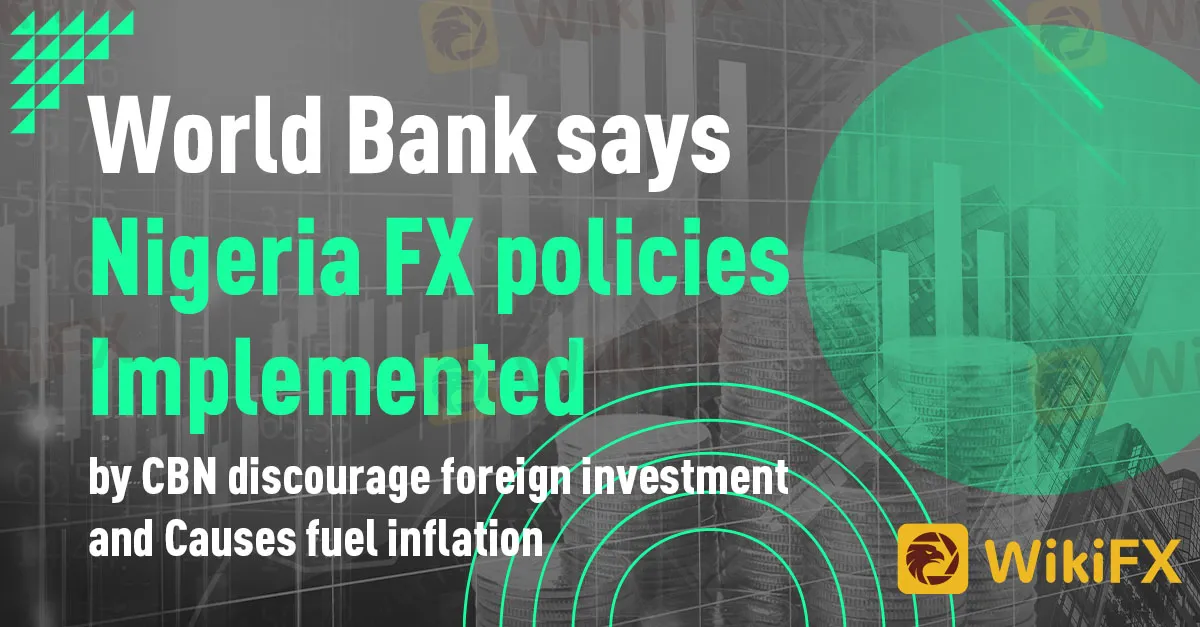简体中文
繁體中文
English
Pусский
日本語
ภาษาไทย
Tiếng Việt
Bahasa Indonesia
Español
हिन्दी
Filippiiniläinen
Français
Deutsch
Português
Türkçe
한국어
العربية
World Bank says Nigeria FX policies Implemented by CBN discourage foreign investment and Causes fuel
Abstract:The World Bank has said improper foreign exchange policies designed and implemented by the Central Bank of Nigeria (CBN) is discouraging new capital investments and causing fuelling inflation in the country.

The World Bank has said improper foreign exchange policies designed and implemented by the Central Bank of Nigeria (CBN) is discouraging new capital investments and causing fuelling inflation in the country.
A lot has been said regarding the poor Forex policies amended by the Central Bank of Nigeria, under the leadership of Emefiele, the recent Comments made by the World Bank highlighted failure and consequences of the CBN policies on Fx. The primary macroeconomic challenges disturbing growth, according to the World Bank, are issues around the predictability and credibility of exchange-rate management, as well as an insufficient supply of foreign exchange (FX). This was disclosed by the World Bank in the November 2021 edition of its Nigeria Development Update tagged “Time for Business Unusual”. In the global lender pointed out that there had been intense pressure on the naira, with the CBN constantly raising the nominal official exchange rate.
The report stated, “The governments exchange rate management policies continue to discourage investment and fuel inflation. Exchange rate stability is a key CBN policy objective, and to preserve its external reserves the CBN continues to manage FX demand and limit the supply of FX to the market.”
While highlighting the role of the Central Bank of Nigeria (CBN) in exchange rate stability, the World Bank said there had been intense pressure on the naira, with the apex bank constantly raising the nominal official exchange rate three times since the start of the pandemic (by 15 per cent in March 2020, five per cent in August 2020, and seven per cent in May 2021), FX management remains too rigid to respond to external shocks. Meanwhile, exchange-rate management has emerged as one of the key drivers of inflation.
The World Bank report also stated that CBN was yet to introduce enough flexibility into FX management to sustainably respond to external shocks, adding that the NAFEX rate was not a true reflection of the market rate.
“The NAFEX rate, which is now the guiding exchange rate for the economy, continues to be managed and is not fully reflective of market conditions. The parallel market premium over the NAFEX rate reached 29 per cent in August 2021 after the CBN cut off its weekly supply of $20,000 per bureau de change. The CBN has intermittently supplied forex to BDCs since 2005, providing ample opportunities for currency round-tripping.” World Bank said.
The World Bank stated that the Nigerian central banks exchange rate cannot handle external shocks to the economy, as exchange-rate management emerges as one of the key drivers of inflation.
Disclaimer:
The views in this article only represent the author's personal views, and do not constitute investment advice on this platform. This platform does not guarantee the accuracy, completeness and timeliness of the information in the article, and will not be liable for any loss caused by the use of or reliance on the information in the article.
Read more

Is Your Forex Strategy Failing? Here’s When to Change
Have you been encountering frequent forex losses? Finding it hard to gain the trading momentum? Can’t understand whether your current forex strategy is in line with the shift in economic indicators or the geopolitical climate? Overcomoming these will require a change to your forex investment strategy. Learn those smart strategic changes here.

Want to be Sure of a Forex Settlement Process? Read This IMPORTANT Guide!
Forex settlements are complex—and missteps can cost millions. This guide breaks down CLS, the global standard in FX settlement, so you can reduce risk and streamline cross-border transactions.

Wondering Why Your International Earnings Come Less Than Expected? It's Because of Forex Markup Fees
You worked for an international project but received payments less than agreed upon. You start wondering whether I remained absent or the client has deliberately reduced the amount. Well, it could be due to forex markup that banks debit. Explore this article to learn more about it.

Rupee Continues to Fall Under Robust Demand for US Dollar
Rupee continued to fall for the sixth time in seven trading sessions on Wednesday (June 4, 2025) under robust demand for the US dollar. The Indian National Rupee slipped past 86 to the US dollar. The fall is attributable to the bullish bets made by traders for the USD. The day saw the rupee falling to 86.025 before recovering to end the day at 85.90. It was 0.4% lower than the previous day's close.
WikiFX Broker
Latest News
Asia-Pacific stocks fall as investors weigh recent trade developments
Is Your Forex Strategy Failing? Here’s When to Change
FSMA Warns That Some Firms Operate as Pyramid Schemes
Apex Trader Funding is an Unregulated Firm | You Must Know the Risks
LVMH shares jump 2.5% after reporting better-than-feared earnings, Texas factory plans
Why Octa Is the Ideal Broker for MetaTrader 4 & 5 Users
Stop Level Forex: How Does it Help Traders Prevail When Losses Mount?
5 things to know before the Thursday open: Meme stock revival, Trump's Fed visit, Uber's gender feature
CNBC's Inside India newsletter: Leaving, but not letting go — India's wealthy move abroad, but stay invested
Moncler raises prices on tariffs, may postpone store openings if downturn worsens
Currency Calculator


